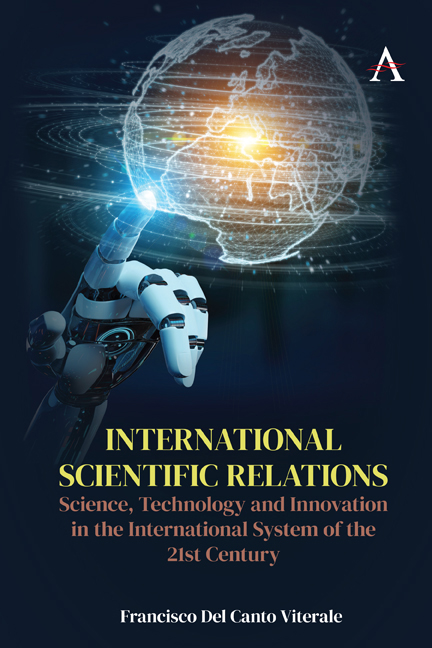 International Scientific Relations
International Scientific Relations Conclusions
Published online by Cambridge University Press: 08 October 2021
Summary
The research carried out to this point has been presented to the reader as an ambitious intellectual work, but also being conscious of the difficulties and limitations faced when analyzing an issue so complex as the link between STI and international relations. Facing such a challenge, the author has carried out a research project approaching a subject of study (science, technology, and innovation), analyzed a subdisciplinary field (international scientific relations), used a disciplinary perspective (focused on international studies, but also openly interdisciplinary), used a methodological focus (systemic paradigm), and applied research techniques (systemic models) that have shown a great descriptive, analytic, and explicative potential. The challenge and the intellectual enterprise were huge, but the social and academic need for specific answers encourages the realization of this project.
The main objective of this research has been studying the empirical space emerging from the interaction between STI and international relations. The analysis has shown three important findings:
– first, the existence of new actors, relations, processes, and phenomena, and a strong agenda that demands more scientific treatment;
– second, the confirmation of a promising and vigorous field of study called international scientific relations;
– third, the fact that STI as a subject matter requires new and deeper approaches from the field of international studies.
Based on this new empirical and academic context, it is pertinent to introduce this research that tries to contribute in the same direction as those scientific works that are encouraged to face the current global challenges. The final result has been an extensive, detailed, and holistic analysis of the new reality of scientific knowledge within the international system and the main changes and continuities that are currently happening in the subfield of ISR. This has allowed us to offer answers to three main problems: (i) the role that STI plays in the current international system, (ii) the main characteristics shown by the current global configuration of ISR, and (iii) the impact that STI and ISR have on the 21st century's international system.
Role of science, technology, and innovation
STI is a determining factor in the 21st century's international system.
- Type
- Chapter
- Information
- International Scientific RelationsScience, Technology and Innovation in the International System of the 21st Century, pp. 223 - 232Publisher: Anthem PressPrint publication year: 2021


